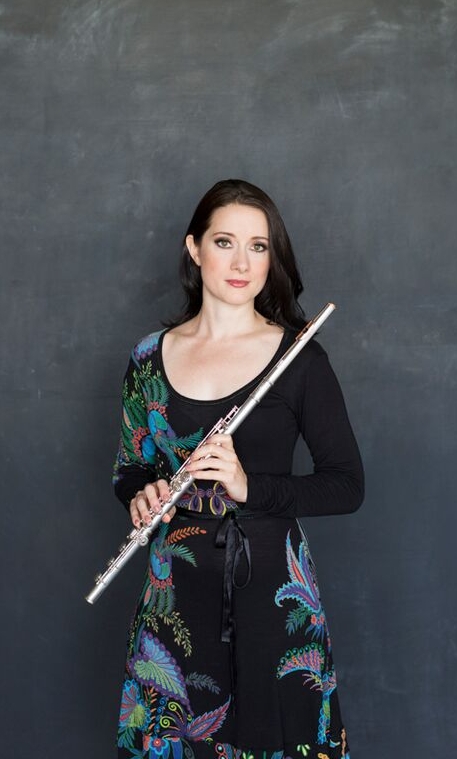River Oaks CO downsizes for ambitious program with Crumb, world premiere

Flutist Brook Ferguson curated a program for River Oaks Chamber Program Saturday night in Houston.
Houston’s River Oaks Chamber Orchestra, unlike many larger ensembles, gives its musicians the opportunity to play chamber music. Each concert in the group’s Unchambered series lets a musician curate his or her own program. The orchestra even kicks in money to commission a work for the occasion.
Principal flutist Brook Ferguson took her turn on Saturday, and sidestepped anything as obvious as a Mozart quartet. Except for Claude Debussy’s Syrinx, her program featured living composers–including the venerable George Crumb, now 89.
Crumb’s Voice of the Whale climaxed the program, and not just musically: Ferguson gave it the quasi-theatrical treatment the score describes. The concert’s location, a multipurpose venue in the Midtown Arts and Theater Center Houston, no doubt helped by having stage lighting at the ready. Blue light bathed the stage and rippled across the acoustical shell; Ferguson, pianist Susan Grace and cellist Richard Belcher wore black masks, as the score calls for.
The theatrical touches may seem gimmicky on paper. But in practice, they wiped away the conventional chamber-concert aura–setting the scene for the unconventional sounds Crumb releases from the familiar instruments. Ferguson and company shaped those timbres into a tone-painting of another world.
Ferguson gave the opening “Vocalise” an aura of stillness and haunting melody—whetehr playing the flute the standard way, or flutter-tonguing it pianissimo or singing through it, Belcher made the cello harmonics at the start of “Variations on Sea-Time” as lyrical as they were stratospheric. Pianist Grace not only punctuated the “Vocalise” with stark fortissimo chords, but she reached into the piano and manipulated the strings to create the murmuring, jangling tones that help make the variations so evocative.
The trio gave the “Mesozoic” variation a force and lustiness that recalled Olivier Messiaen’s exuberant dances. And the final “Sea Nocturne” floated along in gleaming, euphonious tones.
Ferguson, who also serves as the Colorado Symphony’s principal flutist, launched the concert with a very different coup de theatre. After the house lights went down, Debussy’s Syrinx unfolded in darkness–except for one little light, which blinked on the pedal for the tablet computer awaiting on the piano. Ferguson spun out Debussy’s meditation in rich-toned, long-breathed phrases–foreshadowing, perhaps, the stillness that reigns in much of Song of the Whale.
Spirited activity, on the other hand, dominates Michael Gandolfi’s Geppetto’s Workshop. Gandolfi’s flute-and-piano retelling of part of the Pinocchio tale aims for storytelling, as spelled out in lengthy subtitles such as: “Pinocchio ignores the Talking Cricket’s warning and is chased by the Fox and the Cat.” Though Gandolfi’s score doesn’t make the fox and cat sound very threatening, an air of lively antics prevails in most of the work.
Ferguson and Grace brought out the fun through their nimbleness and zip. And in the movement describing the Talking Cricket’s warning–with the flute intoning a slow, quiet theme over the piano’s murmuring imitation of crickets–they conjured up an air of gentle gravity.
Stephanie Ann Boyd’s Sapien, the new work, is a four-movement, 15-minute meditation on humanity and the natural world that preceded us. Commissioned to dovetail with the other works on the program, it evidently takes some inspiration from Voice of the Whale with a section titled “And the oceans, in their depths.” Boyd even tips a hat to Crumb’s cello-glissando imitation of a seagull’s cry.
Boyd doesn’t particularly deal in major-minor harmonies, yet her music still has roots in tradition. Her style centers on broad melodies and other sharply defined themes. Sapiens has character and atmosphere, from the spacious “Meditation on Before” that opens it to the vigorous “The God Particle” finale.
Oboist Alecia Lawyer, the chamber orchestra’s artistic director, joined in Saturday alongside Ferguson, Grace and Belcher. They made Boyd’s melodies ring out imposingly, and they put boldness and vitality into “The Spark (of Life)” and “The God Particle.”
Belcher’s agility enabled the cello part to inject particular energy into “The God Particle.” Even though the powerful Song of the Whale followed, Boyd’s work didn’t let itself be eclipsed.

